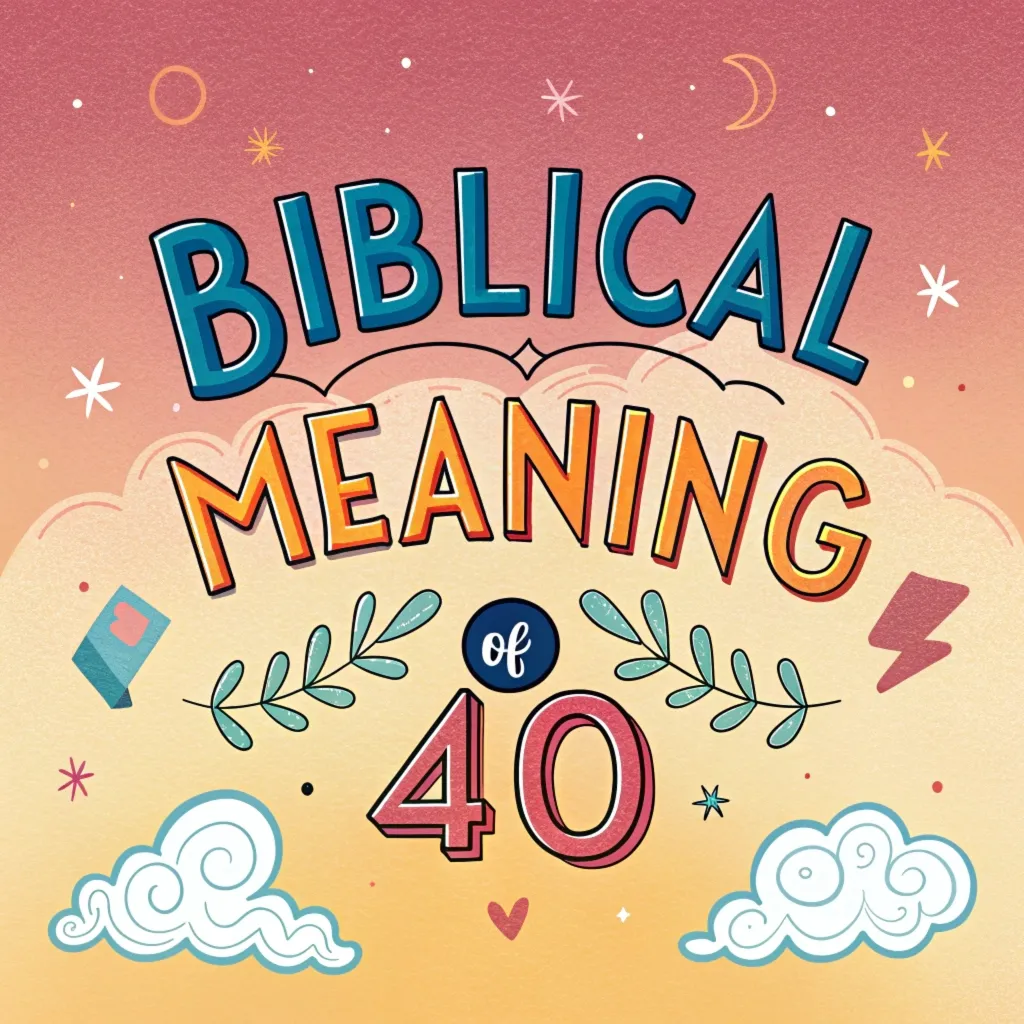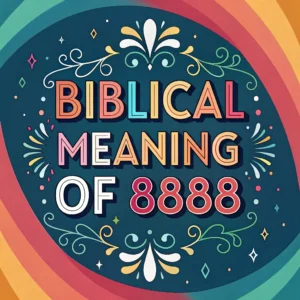Have you ever wondered why the number 40 shows up so much in the Bible? It’s not just a random number. In fact, 40 is very special in many Bible stories. This number often means something big is happening.
It could be a time when people are being tested or when they’re getting ready for something important. From Noah’s big rain to Jesus’ time in the desert, the number 40 keeps popping up.
Let’s explore why this number is so important and what it can teach us about change and growth in our own lives. Get ready to discover the exciting world of 40 in the Bible!
The Essence of 40 in Scripture
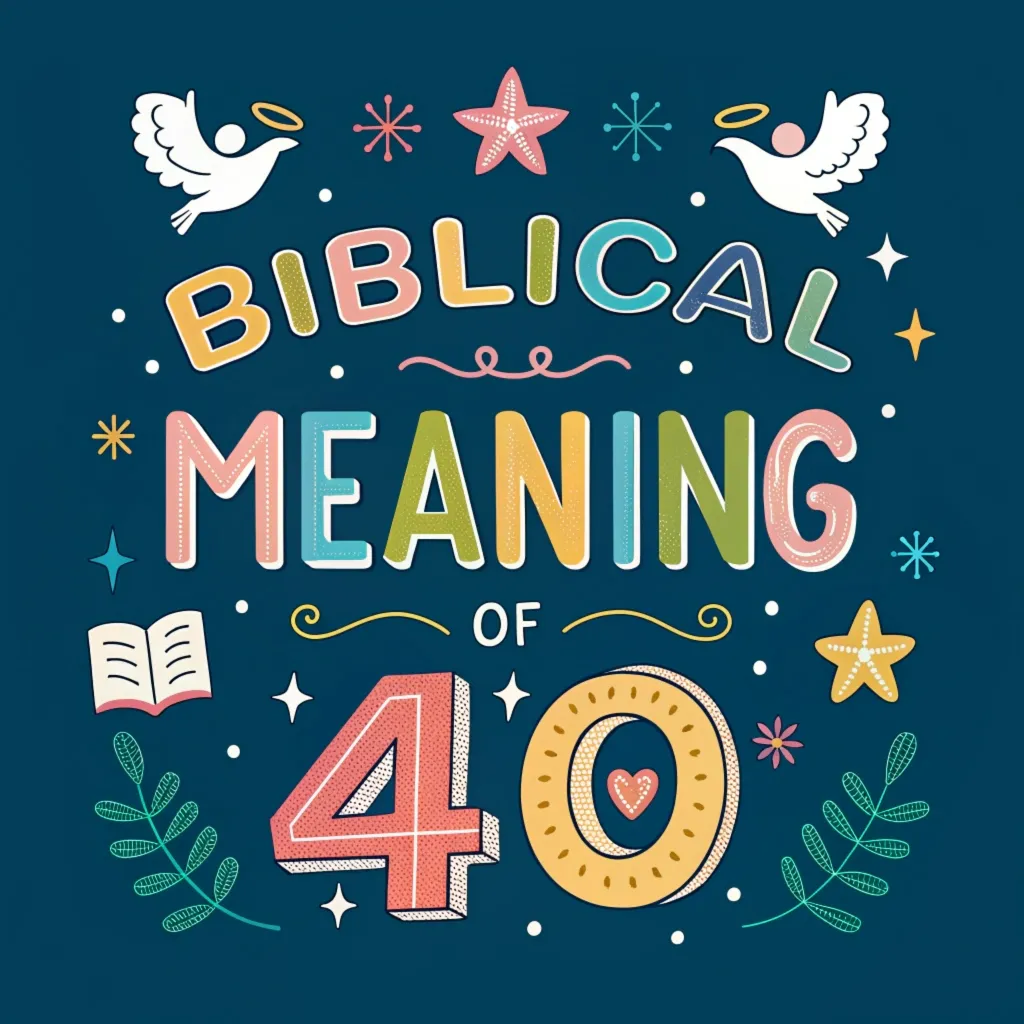
- Testing and Trial: The number 40 frequently represents periods of challenge and spiritual examination.
- Transformation: It signifies times of change, growth, and renewal in biblical stories.
- Divine Intervention: Many instances of 40 involve God’s direct involvement in human affairs.
- Preparation: Often, 40-day or 40-year periods prepare individuals for significant roles or events.
- Generational Shifts: In some contexts, 40 years symbolize the passing of a generation.
- Spiritual Cleansing: The Great Flood and Jesus’ fasting exemplify purification over 40 days.
- Covenant and Promise: God’s interactions with His people often involve 40-day or 40-year periods.
- Leadership and Reign: Several key biblical leaders ruled for 40 years.
- Prophecy and Warning: Prophets used the number 40 in their messages and actions.
- Repentance and Renewal: 40-day periods often precede spiritual revival or new beginnings.
The Flood: A 40-Day Cleansing
The story of Noah’s Ark presents one of the most well-known instances of the number 40 in the Bible. God caused rain to fall for 40 days and 40 nights, flooding the earth to cleanse it of wickedness. This event symbolizes divine judgment and the renewal of creation.
The number 40 in Noah’s story shows how God can use time to make big changes. Imagine if it rained for 40 days where you live. That’s a lot of rain! For Noah and the animals on the ark, this long rain was a chance to start fresh.
It washed away the bad things in the world. When the rain stopped, Noah and his family got to begin a new life on clean land. This teaches us that sometimes, we need to go through hard times to get to better days.
Moses and the Exodus: 40 Years of Wandering
The Israelites’ journey from Egypt to the Promised Land spanned 40 years. This period represented a time of testing and preparation for the new generation. During this time, God provided manna for 40 years, demonstrating His faithfulness and provision.
Think about being on a very long trip that lasts 40 years. That’s how long the Israelites walked in the desert. It might seem like a punishment, but it was also a time to learn. The old group of people who didn’t trust God grew old, and their children grew up.
These children learned to rely on God for food and water in the desert. This long journey taught them to be strong and to have faith. It shows us that sometimes, the path to good things takes a long time, but God helps us along the way.
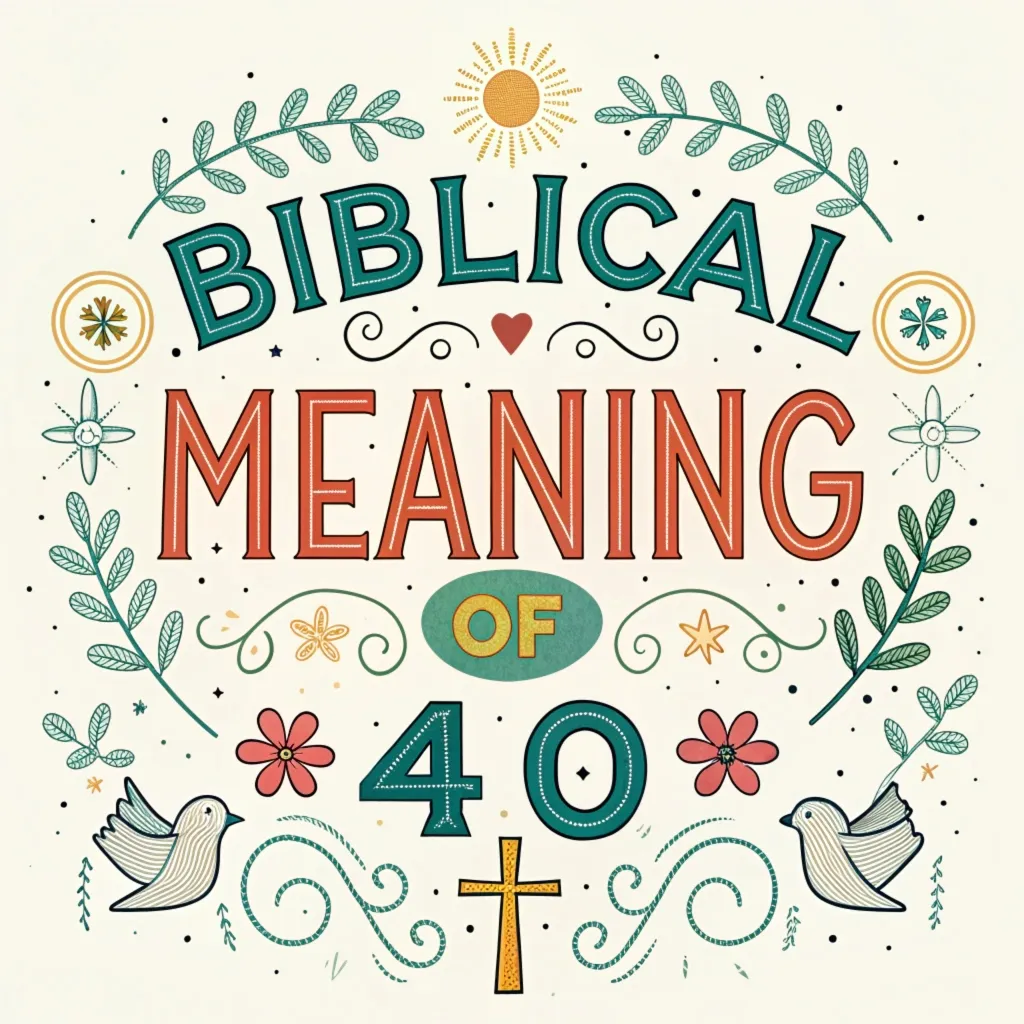
Moses on Mount Sinai: 40 Days of Divine Communication
Moses spent 40 days and 40 nights on Mount Sinai, receiving the Ten Commandments and communing with God. This period highlights the intensity of spiritual preparation and the depth of divine revelation.
Imagine spending 40 days talking with your best friend without any breaks. That’s kind of what Moses did with God on Mount Sinai. During this time, Moses didn’t eat or drink.
He just listened to God and wrote down important rules for people to follow. These became the Ten Commandments. This long time alone with God changed Moses.
When he came down from the mountain, he glowed because he had been so close to God. This shows us that spending time with God can change us in amazing ways.
Jesus in the Wilderness: 40 Days of Temptation
Following His baptism, Jesus fasted in the wilderness for 40 days and 40 nights, facing temptation from Satan. This event parallels the Israelites’ 40 years in the desert, showcasing Jesus’ spiritual strength and victory over sin.
Jesus spent 40 days in a place with no food or people. It was very hard for him. The devil tried to trick Jesus into doing bad things. But Jesus stayed strong and didn’t give in. He used words from the Bible to fight against the devil’s tricks.
This time made Jesus ready for his big job of teaching people about God. It shows us that when things are tough, we can be strong like Jesus if we remember what God says.
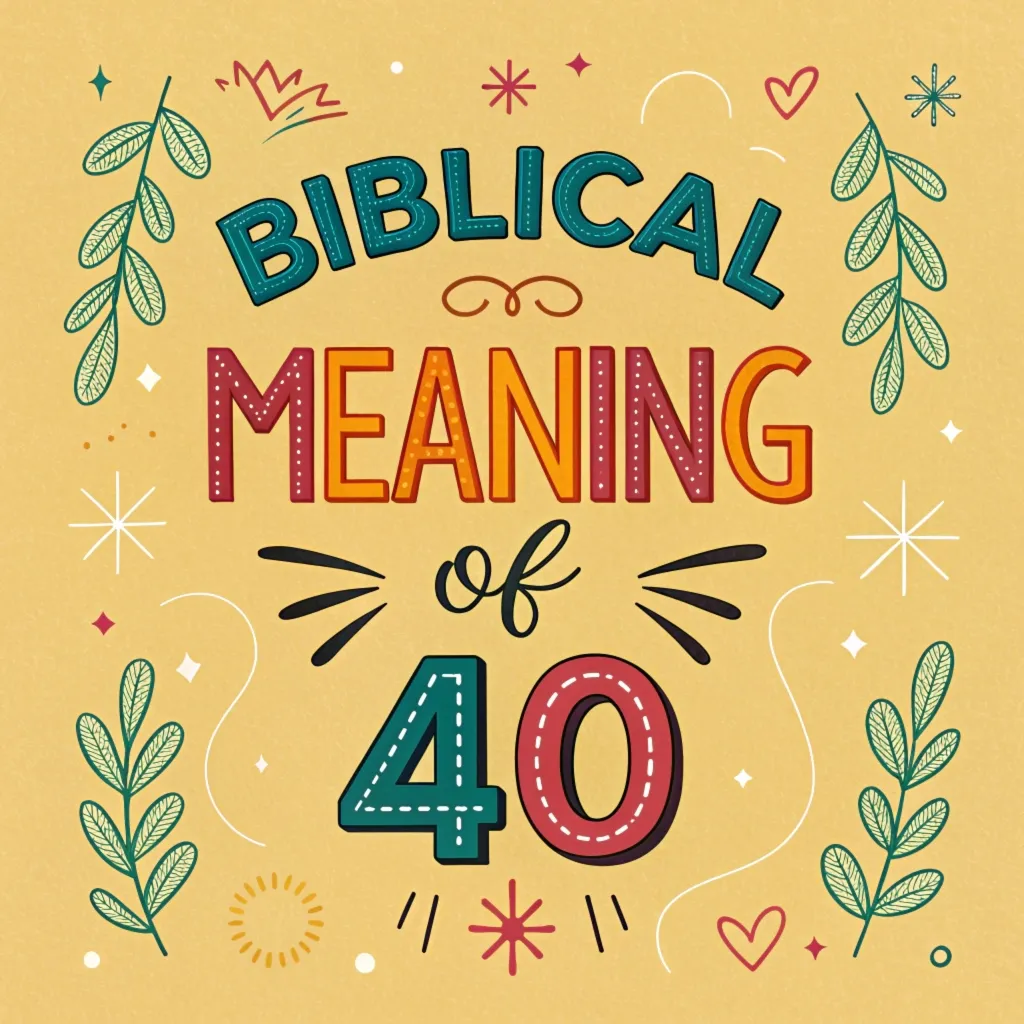
The Reign of Kings: 40 Years of Leadership
The Bible records that three significant Hebrew kings—Saul, David, and Solomon—each ruled for 40 years. This pattern suggests a complete cycle of leadership, encompassing both prosperity and challenges.
In the Bible, some very important kings ruled for 40 years each. This is like having the same president or leader for a very long time. During these 40 years, the kings saw both good times and hard times.
They learned a lot about how to lead people. This teaches us that being a good leader takes time and experience. It also shows that even great leaders face problems, but they can learn from them and become better.
Prophetic Actions: 40 Days of Warning
The prophet Jonah warned Nineveh of impending destruction for 40 days, leading to the city’s repentance. Similarly, Ezekiel lay on his right side for 40 days, symbolizing Judah’s years of iniquity.
These actions demonstrate the use of 40 in prophetic messages and calls to repentance.
Sometimes, God’s messengers did strange things to get people’s attention. Jonah told a whole city they had 40 days to say sorry for being bad, or else bad things would happen.
Another time, a man named Ezekiel lay on his side for 40 days as a sign from God. These 40-day actions were like big alarm clocks, waking people up to listen to God. They show us that God gives people time to change their ways before it’s too late.
The Ascension: 40 Days Post-Resurrection
After His resurrection, Jesus remained on earth for 40 days before ascending to heaven. This period allowed for final teachings and preparations for the disciples to continue His mission.
After Jesus came back to life, he stayed on Earth for 40 more days. This was a special time for his friends. Jesus taught them important things about God’s plan. He helped them understand what they needed to do after he left.
It was like a teacher giving final instructions before a big test. These 40 days made sure Jesus’ friends were ready to tell everyone about him. It shows that Jesus cared about preparing his followers for their big job ahead.
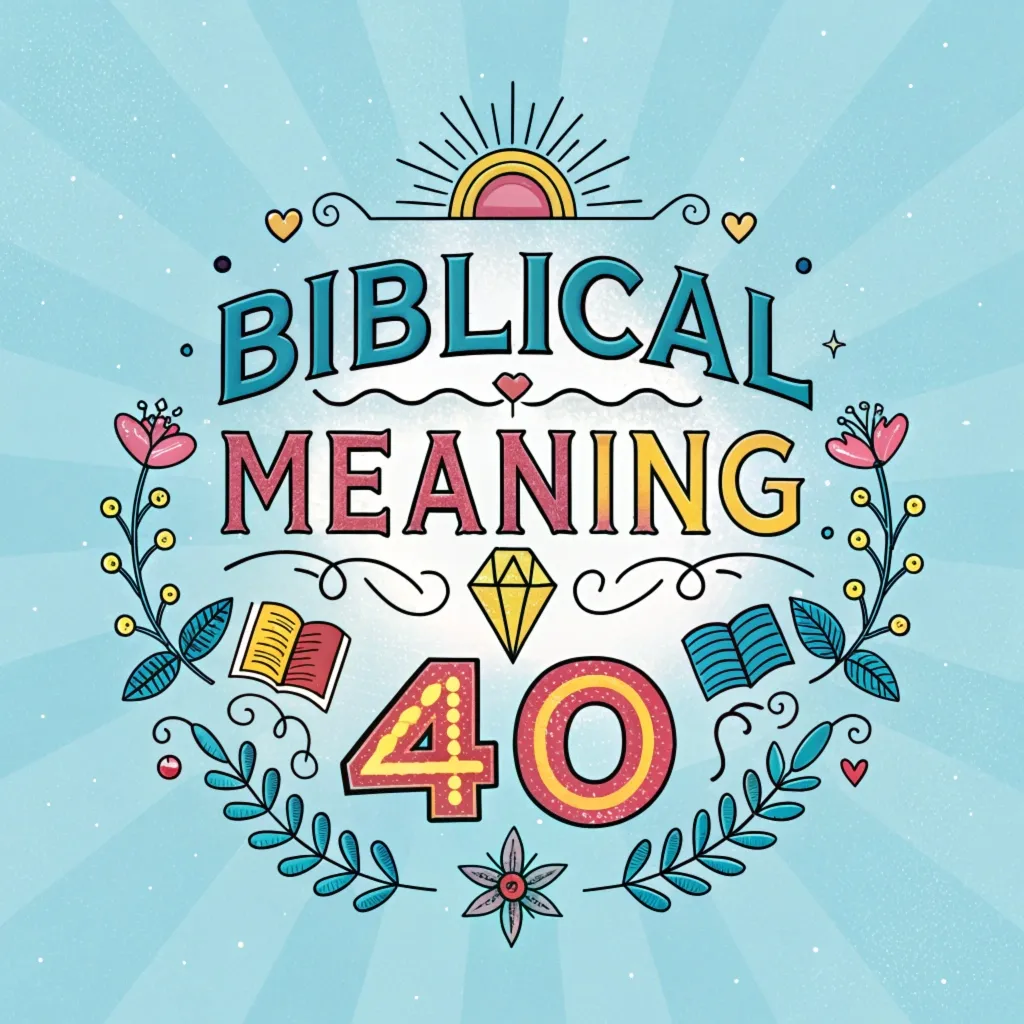
Spiritual Preparation: Fasting and Prayer
Throughout Scripture, 40-day fasts are significant. Moses, Elijah, and Jesus each fasted for 40 days, highlighting the spiritual power of this practice in preparing for divine tasks.
In the Bible, some people didn’t eat food for 40 days to get ready for big things God wanted them to do. This is called fasting. Moses did it before he got the Ten Commandments. Elijah did it before he heard God’s quiet voice.
Jesus did it before he started teaching people about God. Going without food for so long is very hard, but it helped these people focus on God.
It shows us that sometimes, giving up something we like can help us get closer to God and ready for important tasks.
Generational Significance: 40 Years as a Lifetime
In biblical terms, 40 years often represents a generation. This concept is evident in the wilderness wanderings and the reigns of kings, signifying complete cycles of human experience.
In the Bible, 40 years is often seen as the time it takes for a whole group of people to grow up and grow old. It’s like the time from when you’re born until you have your own kids who are grown up.
During the 40 years in the desert, the old group who didn’t trust God died, and a new group who did trust God grew up. This shows us that big changes in how people think and act can take a long time, sometimes as long as it takes for kids to become adults.
Trials and Taunting: Goliath’s 40-Day Challenge
Before David’s victory, Goliath taunted the Israelite army for 40 days. This period of intimidation and testing culminated in a decisive triumph for God’s chosen people.
For 40 days, a big, scary giant named Goliath kept yelling at the Israelite army. He made fun of them and said they were weak. This went on every day, making the soldiers more and more afraid.
But then, a young boy named David came. He wasn’t scared of Goliath. On day 40, David beat the giant with just a sling and a stone.
This story teaches us that even when we face big, scary problems for a long time, we can be brave and win if we trust in God.
Lenten Season: 40 Days of Reflection
In Christian tradition, the 40 days of Lent (excluding Sundays) mirror Jesus’ time in the wilderness. This period encourages self-examination, repentance, and spiritual growth.
Every year, many Christians have a special time called Lent. It lasts for 40 days, just like when Jesus was in the desert. During Lent, people often give up something they like, like candy or video games.
They do this to remember Jesus and to think about how they can be better people. Some people also try to do nice things for others during this time.
Lent helps people get ready for Easter, which is a very happy day for Christians. It shows us that taking time to think about our actions can help us grow and change.
The Significance of 40 in Modern Faith
Today, believers often view 40-day periods as opportunities for intensive prayer, fasting, or spiritual challenges. These practices draw on the biblical precedent of 40 as a time of preparation and transformation.
Many people today still think 40 days is a special time. They might pray more, eat less, or try to be kinder for 40 days. Some churches have 40-day programs to help people learn more about God.
Others might read the Bible more during this time. These 40-day challenges help people focus on becoming better and growing closer to God.
It’s like a spiritual workout that makes people’s faith stronger. This shows that the old idea of 40 as a time of change is still important to many people now.
Numerical Symbolism: Beyond Literal Interpretation
While the number 40 appears frequently, it’s essential to recognize that it may sometimes symbolize a general period rather than an exact count. The significance lies in the spiritual principles it represents.
When we see the number 40 in the Bible, it doesn’t always mean exactly 40 days or years. Sometimes, it’s a way of saying “a long time” or “long enough for something important to happen.” The number 40 is like a symbol.
It tells us that something big or important is happening, even if it didn’t take exactly 40 days. What matters most is not the exact number, but what happened during that time. This teaches us to look for the bigger meaning in stories, not just the numbers.
FAQs
What does the number 40 symbolize in the Bible?
The number 40 typically symbolizes periods of testing, trial, or probation in the Bible. It often marks times of spiritual preparation or transformation.
Why did the Israelites wander for 40 years?
The 40-year wandering was a punishment for the Israelites’ lack of faith and a period of preparation for the new generation to enter the Promised Land.
How long did Jesus fast in the wilderness?
Jesus fasted for 40 days and 40 nights in the wilderness, facing temptation from Satan.
What is the significance of 40 days after Jesus’ resurrection?
Jesus remained on earth for 40 days after His resurrection, teaching and preparing His disciples before ascending to heaven.
How is the number 40 used in Lent?
The 40 days of Lent (excluding Sundays) reflect Jesus’ 40 days in the wilderness, serving as a time for reflection, repentance, and spiritual renewal.

Hello, I’m Zephyra, your guide at SpiritualityEssence.com. I’m passionate about uncovering life’s mysteries and sharing transformative insights. Let’s explore mindfulness, ancient rituals, and the path to a more awakened life together. Join me on this spiritual journey!

